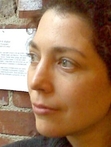My father's notebook
I have only a few things from my father’s childhood. Long after he'd passed away, I found his notebook from his time in primary school, when he was nine years old. Students at the time learned the Sütterlin variant of German cursive. The repetition of the words they had to write — Göbbels, Göggels, Göbbels, Göring, Göring, Göring — chilled me as I looked at the pages. Nazism percolated through every aspect of society, down to the words used in cursive practice. I thought of all the boyish energy suppressed for order in the classroom, for acquiescence and obedience to a murderous regime. I thought, too, of how the Nazis tapped into young boys' desire to be heroic and harnessed this impulse to serve the regime's hateful goals.
Another source of inspiration was Alexsandr Scriabin’s Nocturne for the Left Hand, op. 9, No. 2. I'm not a musical person (as my piano teacher can confirm) and this piece is a little heavier than I normally like, but something about the composition moved me. I thought of Max’s comrade Fischer when I first heard it. Fischer has lost his right arm while fighting on the Eastern front. An accomplished pianist, all he can think of when he returns home is his piano. “I’m starting to play again,” he tells Etta. “I’ve got music already.” The composer Scriabin wrote this remarkable piece after he’d damaged his right hand from overuse. The doctors told him he’d never perform again, but he proved them wrong. And he took misfortune and turned it into something beautiful. Listen to it here.
I collected many more items during the eight years I wrote and revised The Vanishing Sky . A 1939 railway map of Germany, the yellowed 1946 Jahresbuch from the city of Würzburg that details the aerial bombardment and destruction of the city in remarkable detail, the diaries of my great-grandfather from the years between the wars (as painstakingly transcribed by my Aunt Ute). At some level writing a story is borrowing other people’s eyes for a little while so the writer — and hopefully the reader, too — can see the world differently. All these things helped me see the world through my characters’ eyes, and I was a little sad when I finished writing and had to set them all aside.
Another source of inspiration was Alexsandr Scriabin’s Nocturne for the Left Hand, op. 9, No. 2. I'm not a musical person (as my piano teacher can confirm) and this piece is a little heavier than I normally like, but something about the composition moved me. I thought of Max’s comrade Fischer when I first heard it. Fischer has lost his right arm while fighting on the Eastern front. An accomplished pianist, all he can think of when he returns home is his piano. “I’m starting to play again,” he tells Etta. “I’ve got music already.” The composer Scriabin wrote this remarkable piece after he’d damaged his right hand from overuse. The doctors told him he’d never perform again, but he proved them wrong. And he took misfortune and turned it into something beautiful. Listen to it here.
I collected many more items during the eight years I wrote and revised The Vanishing Sky . A 1939 railway map of Germany, the yellowed 1946 Jahresbuch from the city of Würzburg that details the aerial bombardment and destruction of the city in remarkable detail, the diaries of my great-grandfather from the years between the wars (as painstakingly transcribed by my Aunt Ute). At some level writing a story is borrowing other people’s eyes for a little while so the writer — and hopefully the reader, too — can see the world differently. All these things helped me see the world through my characters’ eyes, and I was a little sad when I finished writing and had to set them all aside.
Published on October 25, 2020 19:56
No comments have been added yet.



